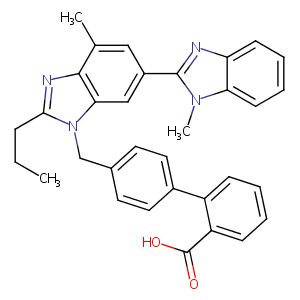| 1 |
ClinicalTrials.gov (NCT01806363) Pharmacokinetic Interactions and Safety Study of Telmisartan and Chlorthalidone
|
| 2 |
URL: http://www.guidetopharmacology.org Nucleic Acids Res. 2015 Oct 12. pii: gkv1037. The IUPHAR/BPS Guide to PHARMACOLOGY in 2016: towards curated quantitative interactions between 1300 protein targets and 6000 ligands. (Ligand id: 7147).
|
| 3 |
Chlorthalidone FDA Label
|
| 4 |
URL: http://www.guidetopharmacology.org Nucleic Acids Res. 2015 Oct 12. pii: gkv1037. The IUPHAR/BPS Guide to PHARMACOLOGY in 2016: towards curated quantitative interactions between 1300 protein targets and 6000 ligands. (Ligand id: 592).
|
| 5 |
Telmisartan FDA Label
|
| 6 |
ClinicalTrials.gov (NCT04359953) Efficacy of Hydroxychloroquine, Telmisartan and Azithromycin on the Survival of Hospitalized Elderly Patients With COVID-19. U.S. National Institutes of Health.
|
| 7 |
The 45-year story of the development of an anti-aldosterone more specific than spironolactone. Mol Cell Endocrinol. 2004 Mar 31;217(1-2):45-52.
|
| 8 |
Detection of low-renin hypertension; evaluation of out-patient renin-stimulating methods. Clin Sci Mol Med. 1975 Feb;48(2):91-6. doi: 10.1042/cs0480091.
|
| 9 |
Deletion of angiotensin II type I receptor reduces hepatic steatosis. J Hepatol. 2009 Jun;50(6):1226-35.
|
| 10 |
Controversies of renin-angiotensin system inhibition during the COVID-19 pandemic. Nat Rev Nephrol. 2020 Apr 3.
|
| 11 |
Predominant contribution of OATP1B3 to the hepatic uptake of telmisartan, an angiotensin II receptor antagonist, in humans. Drug Metab Dispos. 2006 Jul;34(7):1109-15.
|
| 12 |
Establishment of a set of double transfectants coexpressing organic anion transporting polypeptide 1B3 and hepatic efflux transporters for the characterization of the hepatobiliary transport of telmisartan acylglucuronide. Drug Metab Dispos. 2008 Apr;36(4):796-805.
|
| 13 |
The impact of pharmacogenetics of metabolic enzymes and transporters on the pharmacokinetics of telmisartan in healthy volunteers. Pharmacogenet Genomics. 2011 Sep;21(9):523-30.
|
| 14 |
Characterization of in vitro glucuronidation clearance of a range of drugs in human kidney microsomes: comparison with liver and intestinal glucuronidation and impact of albumin. Drug Metab Dispos. 2012 Apr;40(4):825-35.
|
| 15 |
Interference with bile salt export pump function is a susceptibility factor for human liver injury in drug development. Toxicol Sci. 2010 Dec; 118(2):485-500.
|
| 16 |
Toxicological evaluation of acyl glucuronides utilizing half-lives, peptide adducts, and immunostimulation assays. Toxicol In Vitro. 2015 Dec 25;30(1 Pt B):241-9.
|
| 17 |
Inhibitory effects of antihypertensive drugs on human cytochrome P450 2J2 activity: Potent inhibition by azelnidipine and manidipine. Chem Biol Interact. 2019 Jun 1;306:1-9.
|
| 18 |
Metabolic effect of telmisartan and losartan in hypertensive patients with metabolic syndrome. Cardiovasc Diabetol. 2005 May 15;4:6. doi: 10.1186/1475-2840-4-6.
|
| 19 |
Improvement of endothelial function in patients with hypertension and type 2 diabetes after treatment with telmisartan. Hypertens Res. 2010 Aug;33(8):796-801. doi: 10.1038/hr.2010.107. Epub 2010 Jun 17.
|
| 20 |
Effect of telmisartan on ambulatory blood pressure monitoring, plasma brain natriuretic peptide, and oxidative status of serum albumin in hemodialysis patients. Hypertens Res. 2005 Dec;28(12):987-94. doi: 10.1291/hypres.28.987.
|
| 21 |
Telmisartan inhibits CD4-positive lymphocyte migration independent of the angiotensin type 1 receptor via peroxisome proliferator-activated receptor-gamma. Hypertension. 2008 Feb;51(2):259-66. doi: 10.1161/HYPERTENSIONAHA.107.099028. Epub 2007 Dec 24.
|
| 22 |
Telmisartan ameliorates lipopolysaccharide-induced innate immune response through peroxisome proliferator-activated receptor- activation in human monocytes. J Hypertens. 2012 Jan;30(1):87-96. doi: 10.1097/HJH.0b013e32834dde5f.
|
| 23 |
Comparison of the effects of telmisartan and olmesartan on home blood pressure, glucose, and lipid profiles in patients with hypertension, chronic heart failure, and metabolic syndrome. Hypertens Res. 2008 May;31(5):921-9. doi: 10.1291/hypres.31.921.
|
| 24 |
Telmisartan increases the permeability of endothelial cells through zonula occludens-1. Biol Pharm Bull. 2009 Mar;32(3):416-20. doi: 10.1248/bpb.32.416.
|
| 25 |
Differential regulation of tefluthrin and telmisartan on the gating charges of I(Na) activation and inactivation as well as on resurgent and persistent I(Na) in a pituitary cell line (GH(3)). Toxicol Lett. 2018 Mar 15;285:104-112. doi: 10.1016/j.toxlet.2018.01.002. Epub 2018 Jan 3.
|
|
|
|
|
|
|


